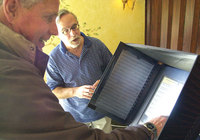Still looking for massive vote fraud
May 23, 2008
Attorney General Greg Abbott tried but came up short, despite months of investigating. As detailed recently by Dallas Morning News senior political writer Wayne Slater, Mr. Abbott documented scattered cases of familiar methods of ballot fraud – schemes involving mail-in ballots, false registrations and manipulation of elderly voters.
Written by Editorial, The Dallas Morning News

The hunt goes on. And on. And on.
Still, proponents of adding new personal identification requirements at Texas polling places haven't produced evidence of an Election Day problem that needs fixing.
Attorney General Greg Abbott tried but came up short, despite months of investigating. As detailed recently by Dallas Morning News senior political writer Wayne Slater, Mr. Abbott documented scattered cases of familiar methods of ballot fraud – schemes involving mail-in ballots, false registrations and manipulation of elderly voters.
These despicable acts undermine the democratic system and should be prosecuted based on state and federal laws already on the books.
But warnings from self-styled voting reformers have focused on other kinds of perceived threats to clean elections – patterns of voter impersonation at the polls and massive fraud using illegal immigrants.
Were those threats real, Mr. Abbott most certainly would have provided proof, helping Republican state lawmakers make their case for new laws requiring a photo ID at the polls to go along with the traditional Texas voter registration card.
He didn't.
In the absence of that proof, GOP legislators appear indifferent to the fact that thousands of registered Texas voters – 150,000 to 400,000, by one estimate – have no photo ID and would face some level of expense to obtain one. Research shows that these voters tend to be elderly, female and poor. They also tend to be Democrats, leaving Republicans to answer to a charge of partisanship.
It should be noted that while research hasn't produced the long-sought evidence of widespread polling-place fraud, neither has it sustained Democrats' complaints of voter suppression through photo ID laws.
The absence of hard data in both categories should be a warning to lawmakers who are eager to remake Texas election law next year. A split U.S. Supreme Court upheld the constitutionality of Indiana's voter ID law last month, guaranteeing momentum for new voter ID proposals in Austin.
There is a simple test for any legitimate voter ID law: It should not shift new, undue burdens onto registered Texas voters and obstruct their constitutionally guaranteed access to the ballot box.
![]()
![]()
Related Stories
![]()
Fair Use Notice
This site contains copyrighted material the use of which has not always been specifically authorized by the copyright owner. We are making such material available in our efforts to advance understanding of environmental, political, human rights, economic, democracy, scientific, and social justice issues, etc. We believe this constitutes a "fair use" of any such copyrighted material as provided for in section 107 of the US Copyright Law. In accordance with Title 17 U.S.C. Section 107, the material on this site is distributed without profit to those who have expressed a prior interest in receiving the included information for research and educational purposes. For more information go to: http://www.law.cornell.edu/uscode/17/107.shtml. If you wish to use copyrighted material from this site for purposes of your own that go beyond "fair use", you must obtain permission from the copyright owner.